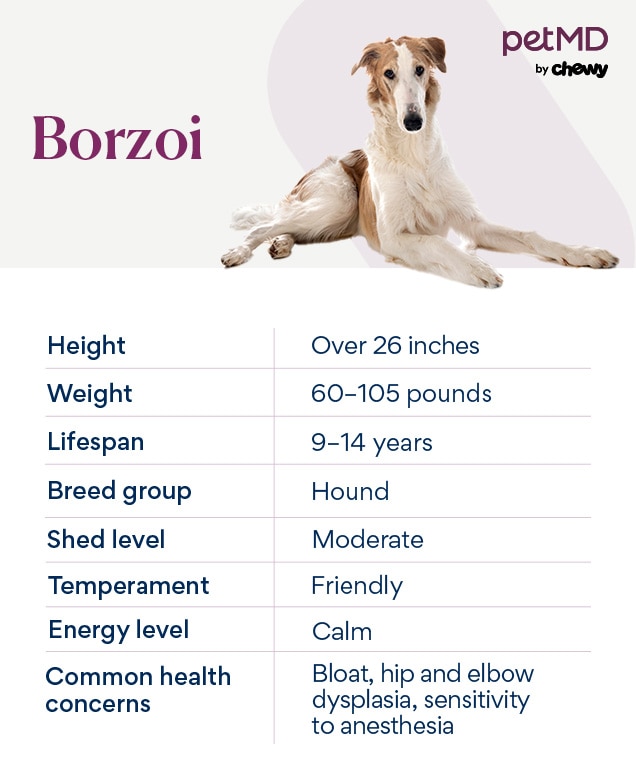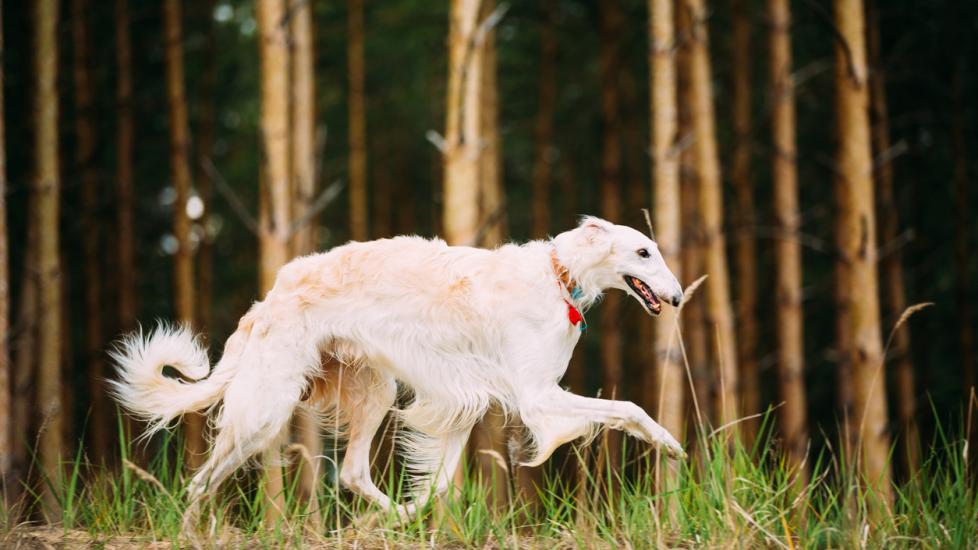Borzoi
Searching for a distinctive, impressive-looking dog? One that’s affectionate and sweet? Active, but not hyper? A Borzoi might be just the dog for you.
Formerly called the Russian Wolfhound, the Borzoi is known for her regal appearance—including a long snout and silky coat—and gentle, friendly demeanor. After all, Borzoi dogs were bred as companions for Russian nobility, according to the Borzoi Club of America (BCA).
Borzoi are a large breed; males stand about 28 inches tall at the shoulder and weigh between 75–105 pounds, while females are a bit smaller at 26 inches tall and 60–85 pounds. These dogs were born to hunt, so they like a moderate amount of activity such as a nice, long walk or a sprint around the yard. But be careful around small animals—being sighthounds, Borzoi have an instinct to chase!
Caring for a Borzoi

Borzoi might look like they’re high-maintenance, but they can be a great choice if you’re seeking a dog that likes low-key companionship. While they’re open to affection and cuddles, including being around children of all ages, Borzoi aren’t big on rough play. They can adjust easily to apartment living and like simple games like tug-of-war. Even a dog this fancy-looking likes to be a goofball!
Keep in mind Borzoi were built to run, and the best way to keep them happy and healthy is with long walks and runs in a fenced-in area. Note the emphasis on the fence here: Borzoi will definitely chase squirrels, cats, and other animals that light up their hunting instincts, so going off-leash in public or open places is not advised. But once they’ve gotten all that energy out, they’re happy to curl up with you on the couch. In fact, that’s what they prefer, and if you can’t be at home with your Borzoi most of the time, you might want to consider a more independent dog.
When they’re not in hunting mode, Borzoi have a sweet, friendly temperament. They may be shy before making canine friends, and if you want to have other pets, it’s wise to socialize them while your Borzoi is young—they will need to learn that the cat (or hamster) living with them is another family member, not something to hunt!
Shop for Your Breed
Borzoi Health Issues
Like many dog breeds, Borzoi have specific health issues to watch out for. But, in general, they are healthy dogs without too many health quirks.
Bloat and Gastric Dilatation-Volvulus
The most common health issue for Borzoi is bloat, which can develop into the life-threatening condition gastric dilatation-volvulus (GDV). This occurs when the stomach fills with gas, food, and fluid, and then twists, cutting off the blood supply.
Borzoi dog parents need to stay alert for the signs of GDV and bloat, including:
-
Restlessness or pacing
-
Stretching in a “praying mantis” position
-
Distended stomach
-
Dry heaving
-
Retching or vomiting
-
Excessive drooling
If you notice any of these symptoms, contact your veterinarian or take your dog to an emergency vet immediately.
Sensitivity to Anesthesia
All sighthounds, including the Borzoi, are slower to recover from general anesthesia or heavy sedatives than other breeds because of their lean muscle mass and low body-fat percentage, which makes them absorb the drugs more slowly. This doesn’t mean they should avoid anesthesia—rather, veterinarians are more mindful when it comes to anesthesia-sensitive breeds. Talk with your vet before any surgery or procedure that would require general anesthesia or sedation, keeping in mind how your Borzoi might react.
Hip and Elbow Dysplasia
Russian Borzoi are prone to hip dysplasia and elbow dysplasia. Both conditions occur when the joints form incorrectly and don’t fit together properly, leading to pain and arthritis. Treatment depends on the severity and can fall anywhere between management with pain medication to surgery. To help manage their dysplasia, keep your Borzoi well-exercised and at a healthy weight.
Osteochondritis Dissecans (OCD)
Though more uncommon, Borzoi can develop osteochondritis dissecans. Known as OCD, it’s an inflammatory disease that occurs when the cartilage in joints separates from the bone. OCD is most common in a dog’s shoulder but also occurs in the elbow, hip, and knee joints. This is mostly seen in large-breed dogs that experience rapid growth as puppies. Talk to your vet if you notice any swelling, limping, or signs of pain in your dog.
Progressive Retinal Atrophy (PRA)
Borzoi dogs can also develop progressive retinal atrophy (PRA), an inherited eye condition. This is when the rods and cones in a dog’s eye don’t develop properly, leading to complete blindness. There is no treatment for PRA, but with proper care and attention, blind dogs can live long, healthy lives.
What To Feed a Borzoi
Feed your Borzoi a high-quality dry dog food approved by the Association of American Feed Control Officials (AAFCO). Ask your veterinarian about the best dog food that’s available to buy. Also keep in mind that your Borzoi may have her own opinions about the food you feed her—these independent-minded dogs can be fussy eaters.
How To Feed a Borzoi
Borzoi puppies should eat three meals per day on a regular feeding schedule, while an adult dog can eat two meals a day. Be mindful of her age and look for foods designed for your dog’s current life stage (puppy, adult, or senior).
Free-feeding Borzoi isn’t the best idea, as these slender dogs can easily become overweight or obese if they are overfed.
How Much Should You Feed a Borzoi?
Borzoi are large dogs, and therefore they need quite a bit of food. However, because they have a lean, delicate frame, there’s no need to feed them an excessive amount. (Too much food may also result in bloat, one of the most common health concerns in Borzoi.)
Follow the instructions on your dog food bag to find the recommended portion size for your dog based on her weight. But a Borzoi’s health and lifestyle also play a role in how much she should eat, so speaking with your veterinarian for guidance is best.
Nutritional Tips for Borzoi
Your Borzoi dog can get all of her nutritional needs met when fed a high-quality, AAFCO-approved diet. But because the breed can be prone to OCD and hip and elbow dysplasia, it could be beneficial to give them joint supplements. Always talk with your vet before giving any supplements to your dog.
Behavior and Training Tips for Borzoi
Borzoi Personality and Temperament
Borzoi dogs have a sweet, friendly personality and temperament, making them great with people of all ages, including children. They don’t like rough play, but they are affectionate, silly, and like some low-key games. They can be shy around new people, so it’s important to socialize your Borzoi puppy early so to be comfortable around strangers and in new situations.
Borzoi Behavior
Despite their robust size and elegant coat, Borzoi can be sensitive and aloof. They love to be companions to their humans, and they don’t like to be left alone for too long. But this gentle giant does have an instinct to chase anything that moves, so keep your friend on the leash in public.
Borzoi Training
Bred to hunt side-by-side with Russian royalty, Borzoi are obedient and smart dogs. They do best with training that uses positive reinforcement, patience, and repetition.
Fun Activities for Borzoi
-
Tug-of-war
-
Fetch
-
Agility
-
Long walks
-
Running (inside enclosed areas!)
-
Lure coursing
-
Scent work
Borzoi Grooming Guide
The Borzoi is famous for her silky coat, which can be black, brindle, cream, white, or many other colors and patterns. The coat does require frequent maintenance, and pet parents also need to trim their dog’s nails regularly.
Skin Care
Borzoi dogs don’t typically have sensitive skin, so occasional baths are all that’s needed to keep them healthy. Avoid shampoos that are drying and look for one with aloe or oatmeal to help hydrate the skin.
Coat Care
The Borzoi’s coat needs to be brushed at least two to three times a week with a firm bristle brush, but daily brushing is best. These dogs shed throughout the year and go through a heavy shedding period once a year, according to the BCA. Staying on top of brushing will help keep that silky fur from clinging to your clothes and furniture and prevent tangles in their long locks.
Because of their size, bathing these dogs might be tricky. You can keep their fur clean and shiny in between baths with doggy dry shampoo.
Eye Care
Because Borzoi are prone to developing PRA, pet parents must monitor their dog’s eyes for signs of this condition. If you notice your Borzoi bumping into things, especially at night, take her to the vet for an eye exam.
Ear Care
During grooming sessions, check your Borzoi’s ears. If you notice any redness, odor, or debris buildup, this could be a sign of an ear infection and should be looked at by a vet.
Considerations for Pet Parents
Before deciding on a Borzoi puppy, consider your lifestyle. Borzoi are large, but not overly imposing or heavy. They do well in apartments, but benefit from a fenced-in yard where they can run safely.
While they are natural athletes and bred to hunt, they are low-key most of the time and can be kept healthy with long walks and the occasional run in an enclosed area. But keep in mind that they will chase anything that moves, so keep them on the leash at all times when on walks or at parks.
Borzoi are sweet and friendly, including with children and other dogs, but socializing them early is key to helping them feel comfortable in new situations. The bulk of care will be dedicated to grooming and keeping that silky fur free of tangles.
Borzoi FAQs
How much does a Borzoi puppy cost?
A Borzoi’s price depends on where you live, the breeder, and the dog’s lineage. This can be anywhere from $1,500–$5,000. You can also find dogs available for adoption through Borzoi rescues.
How rare is a Borzoi?
The Borzoi is a rare dog breed in the U.S. They are currently ranked as the 101st most popular breed by the American Kennel Club.
How long do Borzoi live?
The Borzoi lifespan is typically 9–14 years.
Featured Image: iStock/Ryhor Bruyeu
